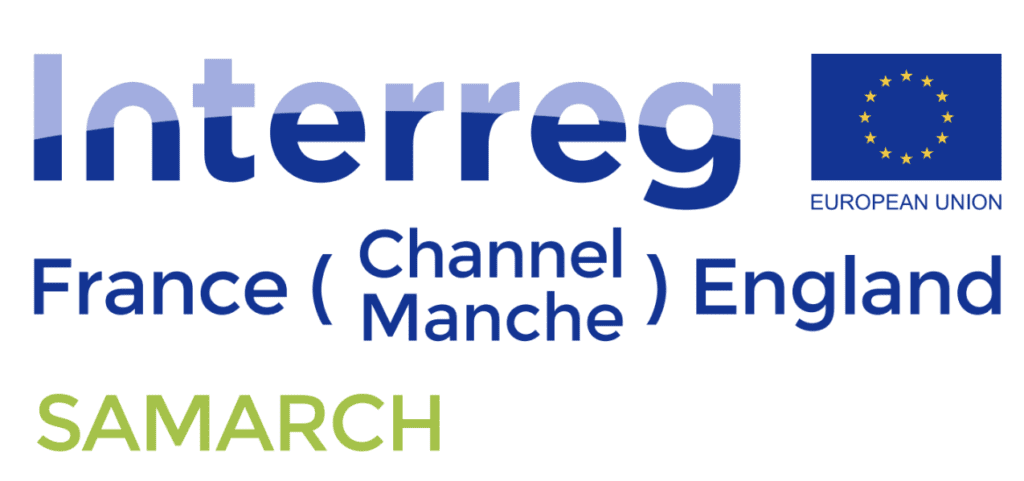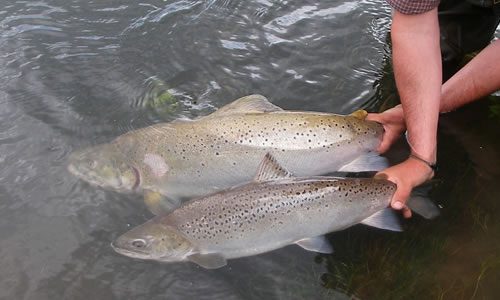The SAlmonid MAnagement Round the CHannel (SAMARCH) project, set out to deliver new information to improve the protection of our threatened wild salmon and sea trout in estuaries and coastal waters, started in 2017 and now holds its closing conference on the 14th and 15th of March 2023 in Southampton.
Part Funded (69%) by the Interreg France England Channel Programme and with significant contributions from the Missing Salmon Alliance (MSA), SAMARCH has been a collaboration between scientists and those involved in the protection and management of our threatened wild salmon and sea trout with a particular focus on stocks in the rivers of the France England Channel area. Wild salmon in particular are under threat, having declined significantly over the last 40 years. Now, most populations in our rivers are classified as “at risk” by the government.
The reasons for the declines are complex and a combination of climate change effects and more direct man-made issues in freshwater, estuaries and at sea. SAMARCH focused on the more direct anthropogenic impacts. For example, the Channel’s waters are some of the most intensively fished and developed waters in the whole of Europe which may cause a number of issues; from the by-catch of these fish in commercial fisheries to disturbance, displacement and loss of habitats by estuarine and coastal developments such as dredging and renewable energy schemes.
The effective protection of these fish has often been hampered by a lack of information, evidence and data. SAMARCH aimed to fill this gap. The project was led by key MSA member, the Game and Wildlife Conservation Trust (GWCT), and brought together a partnership between those involved in the management and research of wild salmon and sea trout on both sides of the Channel.
The project has undertaken a number of research projects to collect new information on the behaviour of juvenile and adult salmon and sea trout in the estuaries of four rivers and the Channel’s coastal waters. SAMARCH collected new data and analysed historical data to provide new and updated information to inform the salmon stock assessment models used in England and France to more accurately manage stocks. It engaged with stakeholders at local, national and international levels, policy makers, and provided training for future managers.
SAMARCH achieved the following:
- Collected information on the timings, movements and survival of 900 juvenile salmon and sea trout through the lower river and estuary of 4 rivers.
- Tagged 314 adult sea trout in 3 rivers and collected data from 84 of them on their marine movements, swimming depths, survival and reasons for mortality at sea.
- Individually tagged nearly 100,000 juvenile salmon and trout on two rivers to assess marine survival rates
- Collected data from 24,000 juvenile salmon and trout (called “smolts”) as they migrated out to sea in Spring
- Used molecular genetics to sex 9,500 juvenile salmon and trout
- Read 10,000 sets of salmon scales for changes in the ages and growth of fish at sea since 1971.
- Developed genetic data bases for salmon and trout from all rivers flowing into the Channel’s waters
- Assigned sea trout caught at sea back to their rivers of origin
- Published 17 Scientific papers thus far
- Two PhD projects
- 12 MSc projects
- Over 200 students have received experience over the project’s 6 years
Now, the project holds its closing conference on the 14th and 15th of March 2023 in Southampton. Day one of the conference will present the findings of the project’s research with recommendations of what needs to be changed to better protect our threatened populations of wild salmon and sea trout in estuaries and coastal waters. Day two will provide time for discussions and debate between policy makers, managers, scientists, and key stakeholders.
Dylan Roberts, Head of Fisheries for the Game and Wildlife Conservation Trust, who pulled together the SAMARCH project application and managed the project said “It’s been a fascinating journey into the salty world of these amazing fish, and we have provided a huge amount of new information and recommendations for change for managers. I look forward to two days of enjoyable debate. However, one issue which has caught my attention during this journey is that despite our iconic wild salmon and sea trout having swum between the sea and our rivers since the ice age and spending up to two thirds of their life at sea, they are poorly considered in marine protection at all levels. If we are serious about ensuring that these fish survive for future generations, this has to change.”
Ends
PR Contacts:
MSA Iona Mackay: iona@zambuni.com 07504661424
SAMARCH/GWCT Sarah Bayley Slater sbayleyslater@gwct.org.uk
Notes to Editors:
SAMARCH
SAMARCH (2017 – 2023) is part funded 69% through the EU’s Interreg France England Channel ProgrammeThe partners in the SAMARCH programme: UK – Game & Wildlife Conservation Trust, University of Exeter, Environment Agency, WildFish Conservation (Formally Salmon & Trout Conservation), Bournemouth University. France – INRAE, I’insitut Agro Rennes Angers, Office Francais de la Biodiversité, Seine-Normandie Migrateurs, Bretagne Grands Migateurs
Salmonids – from the family (Salmonidae), elongated bony fishes, which include salmon and trout (and their migratory form known as sea trout).
Missing Salmon Alliance
Founded in 2019, a group of Britain’s leading conservation-focused organisations formed the Missing Salmon Alliance. Their combined expertise has continued to drive action to save our wild Atlantic salmon from the brink of extinction. The member organisations are the Atlantic Salmon Trust, the Game & Wildlife Conservation Trust, the Angling Trust with Fish Legal, Fisheries Management Scotland, and the Rivers Trust.


Comment *Bonjour,
Existe t il des vidéos de cette clôture de ce projet passionnant SAMARCH du 14 et 15 mars 2023 à Southampton et quels en sont les résultats
Philippe CHEVREL